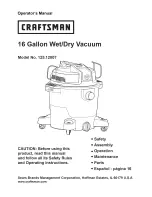
CUSTOMER RESPONSIBILITIES
26
0
°
F (--18
°
C) and below
0
°
F (--18
°
C) and above
TYPE OF OIL
TEMPERATURE
synthetic 5W30
S.A.E. 5W30
°
F
-20
0
20
32
40
°
C
--30
--20
--10
0
10
SAE VISCOSITY GRADES
5W30
synthetic 5W30
FULL
Oil Fill Cap/Dipstick
Figure 21
NOTE: Oil level must be at FULL mark.
Oil Drain Plug
Figure 22
ENGINE
Check Crankcase Oil Level
before starting engine and after
each 8 hours of continuous use (see Figure 21). Add the
recommended motor oil as required.
NOTE: Overfilling the engine can affect performance.
Tighten the oil fill cap securely to prevent leakage.
Change Oil
every 50 hours of operation or at least once a
year, even if the snowthrower is not used for fifty hours. Use
a clean, high quality detergent oil. Fill the crank case to FULL
line on dipstick (see Figure 21). Be sure original container is
marked: A.P.I. service “SF” or higher. Do not use SAE10W40
oil (as it may not provide proper lubrication). See Chart for oil
recommendations.
To Drain Oil
− Position snowthrower so
that the oil drain plug
is lowest point on engine. When the engine is warm, remove
oil drain plug and oil fill cap and drain oil into a suitable
container (see Figure 22).
Replace oil drain plug and tighten securely. Refill crank case
with the recommended motor oil.
EMISSIONS CONTROL
Maintenance, replacement, or repair of the emissions control
devices and systems may be performed by any non-road engine
repair establishment or individual. However, to obtain “no charge”
emissions control service, the work must be performed by a facto-
ry authorized dealer. See the Emissions Warranty.
ENGINE POWER RATING INFORMATION
The gross power rating for individual gas engine models is labeled
in accordance with SAE (Society of Automotive Engineers) code
J1940 (Small Engine Power & Torque Rating Procedure), and rat-
ing performance has been obtained and corrected in accordance
with SAE J1995 (Revision 2002-05). Torque values are derived at
3060 RPM; horsepower values are derived at 3600 RPM. Actual
gross engine power will be lower and is affected by, among other
things, ambient operating conditions and engine-to-engine vari-
ability. Given both the wide array of products on which engines are
placed and the variety of environmental issues applicable to oper-
ating the equipment, the gas engine will not develop the rated
gross power when used in a given piece of power equipment (actu-
al "on-site" or net power). This difference is due to a variety of fac-
tors including, but not limited to, accessories (air cleaner, exhaust,
charging, cooling, carburetor, fuel pump, etc.), application limita-
tions, ambient operating conditions (temperature, humidity, alti-
tude), and engine-to-engine variability. Due to manufacturing and
capacity limitations, Briggs & Stratton may substitute an engine of
higher rated power for this Series engine.
Not
for
Reproduction
















































